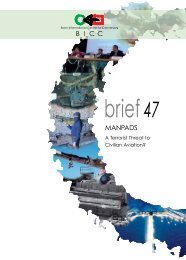egypt-final-presidential-elections-2012
egypt-final-presidential-elections-2012
egypt-final-presidential-elections-2012
Create successful ePaper yourself
Turn your PDF publications into a flip-book with our unique Google optimized e-Paper software.
The Carter Center<br />
The Media Environment and<br />
Access to the Electoral Process<br />
Media plays a pivotal role in the electoral<br />
process. In Egypt, it is a main source of<br />
information for electoral stakeholders and<br />
one of the main tools of campaigning. Although The<br />
Carter Center was not able to conduct a comprehensive<br />
media-monitoring effort, the following are limited<br />
observations on the relevant laws, regulations, and<br />
their implementation within election polling centers.<br />
Media Freedom: Freedom of expression, along<br />
with freedom of the press, is guaranteed in Egypt’s<br />
Constitutional Declaration. 121 At the same time,<br />
however, there are a number of legal provisions in<br />
place to regulate the media. Together with Egypt’s<br />
Emergency Law, 122 which was effective until May<br />
31, <strong>2012</strong>, and with the repressive Ministry of Justice<br />
Decision No. 4991, enacted shortly before the second<br />
round of the election and only invalidated by a court<br />
after the election, these provisions curb, or have the<br />
potential to curb, media freedoms. 123 Reported steps<br />
to intimidate members of the media are troubling, run<br />
counter to international practice, and should be rectified<br />
by Egyptian authorities in any future <strong>elections</strong>. 124<br />
Since the January 2011 uprising, strict, systematic,<br />
government oversight of the media has appeared to<br />
loosen to some extent, but many red lines still remain<br />
with regard to what the media can freely convey to<br />
the public. Along with activists, both professional<br />
and citizen journalists have faced interrogation,<br />
and in some cases, military trials, for criticizing the<br />
SCAF and its management of the transition. In other<br />
instances, satellite television licenses have been<br />
suspended for related reasons. 125 Media freedom is a<br />
precondition for a functioning democracy as well as<br />
free and fair <strong>elections</strong>. 126 The Carter Center urges<br />
Egypt’s lawmakers to ensure the laws in place safeguard<br />
media freedom in the future.<br />
The Media in Egypt in <strong>2012</strong>: Despite the restrictions<br />
outlined, Egypt has a relatively vibrant and<br />
diverse mass communications media comprised of<br />
state, party, and independent media, which played a<br />
significant role in scrutinizing the candidates as well<br />
as the aspects of the electoral process to which they<br />
had access. Granting media unrestricted access to all<br />
phases of the election is an important measure for<br />
ensuring transparency of the process. Articles 30 and<br />
38 of the Law Regulating the Presidential Election<br />
grant the media access to the polling, counting, and<br />
tabulation processes 127 at the polling-station level as<br />
well as to the vote aggregation and the announcement<br />
of results for each candidate at the district<br />
general-committee level.<br />
Unnecessary limitations on media access to the<br />
electoral process remain, however. PEC Decision<br />
No. 16 issued on May 2, <strong>2012</strong>, articulated the rules<br />
for media access. In accordance with PEC Decision<br />
121 Articles 12 and 13, Constitutional Declaration of March 30, 2011<br />
122 The Emergency Law was modified in January <strong>2012</strong> but still allowed<br />
journalists to be subjected to punishment, including imprisonment, for the<br />
vaguely defined crime of “thuggery.”<br />
123 In Egypt, there are a number of legal provisions that govern<br />
media that are often overlapping and contradictory. They include the<br />
Constitutional Declaration, the press legislation, the press code of<br />
conduct, the broadcast code of conduct, penal codes, and the Emergency<br />
Law. In addition, the Higher Council of the Press, the Journalist<br />
Syndicate, the Egyptian Radio and Television union, the Ministry of<br />
Information, and the courts regulate and oversee different aspects of<br />
the media.<br />
124 AU, Declaration on Principles on Freedom of Expression in Africa,<br />
Article 11.1-2<br />
125 http://www.hrw.org/news/<strong>2012</strong>/02/11/<strong>egypt</strong>-year-attacks-freeexpression<br />
126 U.N., United Nations Human Rights Committee, General Comment<br />
25 on “The Right to Participate in Public Affairs, Voting Rights and the<br />
Right to Equal Access to Public Service,” para. 25.<br />
127 See, for example, Norwegian Helsinki Committee, “Election<br />
Observation” in Manual on Human Rights Monitoring: An Introduction<br />
for Human Rights Field Officers, p. 15: “The media should be assured by<br />
the government of: 1) the right to gather and report objective information<br />
without intimidation; and 2) no arbitrary or discriminatory obstruction or<br />
censorship of campaign messages.”<br />
43



